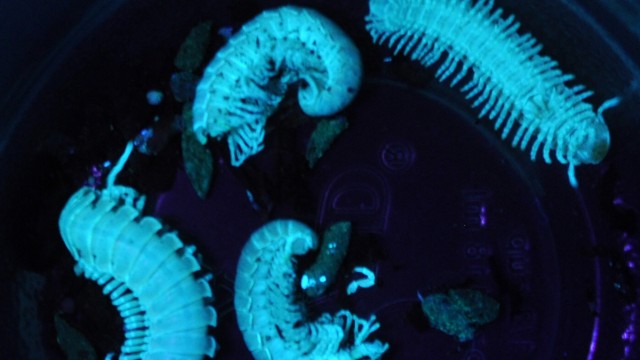Science News
Arthropod Spring Break
March 27, 2012

Drunk, hot and glowing-- it must be Spring Break with the recent news about insects and other arthropods.
Given the headlines, you’d think that fruit flies have been listening to too much country music—the old-school kind. That’s because a study, published in Science two weeks ago, reports that male fruit flies drown their sorrows in alcohol when jilted by female fruit flies.
Poor guys. The study authors, including researchers from nearby UC San Francisco, found that it all has to do with chemical signals in their brain (doesn’t it always?). You can read more and even see a video (probably R-rated, if you’re a fruit fly) at Nature News.
Some like it hot, some don’t. Japanese honey bees swarm around Asian giant hornets to cook them to death-- preventing the hornets from stealing the bee larvae. This isn't news, but Japanese researchers wanted to find out what exactly was going on in the bees' brains during this hot ball defense. New Scientist reports:
…the bees must maintain a very precise temperature in the ball. "If the temperature drops below 46 °C, the hornet will not be killed, whereas if it's any hotter both the hornet and the bees will be killed," [lead researcher Takeo Kubo] says. The team thinks that the neural activity causes bees to modulate the movement of their flight muscles to maintain a constant level of heat.
The research is published in PloS ONE. New Scientist has a video of the deadly swarm.
Finally, here's a glowing twist of fate. Researchers, studying the rat population on Alcatraz, discovered fluorescent millipedes instead. KQED Quest reports that the researchers used a black light to trace glowing rat droppings, thanks to rat bait laced with a non-toxic fluorescent dye. In addition to the rat poop, the black light exposed the glowing millipedes. This fluorescent arthropod may be a subspecies of a common millipede found throughout the Bay Area:
Alcatraz Island is far enough from the mainland for a new species to evolve, though it would take millennia for that to happen.
UC Davis researchers are working to discover more, KQED reports. Stay tuned...